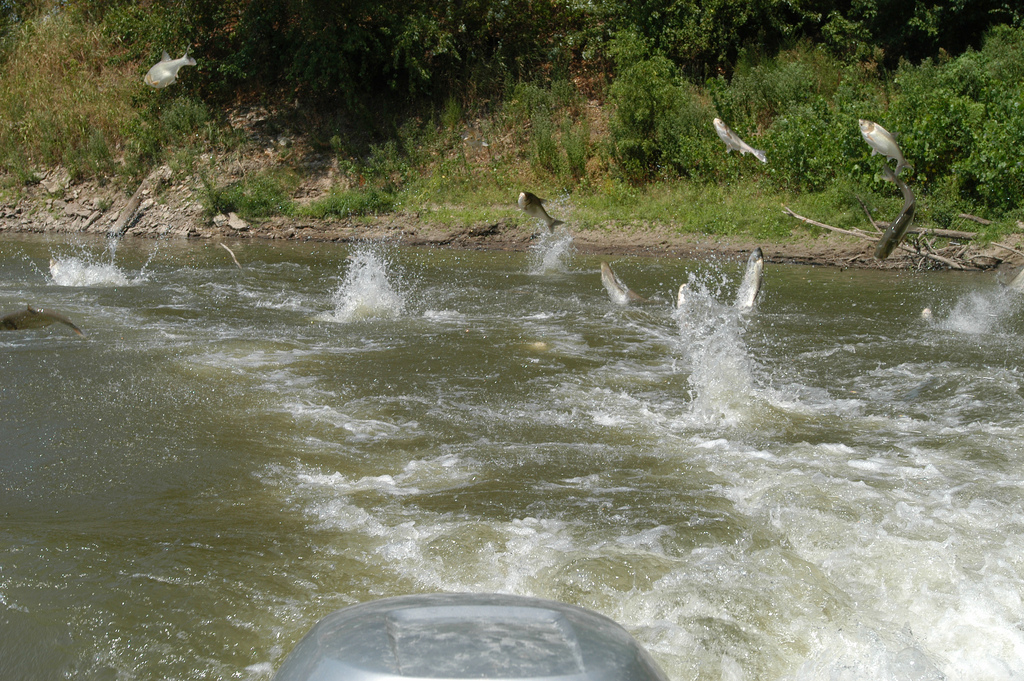Business Leaders Meet at Shedd Aquarium to Discuss Protecting, Restoring Vitality of Great Lakes
Great Lakes Business Network, Shedd Link Arms to Elevate Business Community Support for Conservation Policy to Protect Waterways from Invasive Species, Including Asian Carp
CHICAGO – Through a collaboration between the Great Lakes Business Network and Shedd Aquarium in Chicago, more than 30 internationally-recognized business, science and policy leaders gathered yesterday to discuss efforts to protect the Great Lakes, its fisheries and local economies from the threat of invasive species, especially Asian carp. During the invite-only event that took place in Shedd Aquarium’s Presidential Conference Rooms, the leaders talked about how to unite and amplify the business community’s voice to better advance science-driven Great Lakes conservation policy locally and bi-nationally.
As the largest freshwater ecosystem on Earth, the Great Lakes are home to more than 3,500 plant and animal species, like the bald eagle, gray wolf, lake sturgeon, wood duck and American bullfrog. This wildlife is critical to the Great Lakes outdoor economy, supporting a $7 billion fishery, $16 billion tourism industry and over 1.6 million jobs within the region. During the forum, experts underscored the threat of invasive species to local livelihoods and strategized how businesses can be part of the solution. The event was the first of many to empower businesses to advocate for and ultimately safeguard the Great Lakes region’s wildlife and economies.
Leading the discussion at Shedd Aquarium were experts from across the Great Lakes region, including Mike Shriberg, Ph.D., regional executive director of the National Wildlife Federation’s Great Lakes Regional Center, Karen Murchie, Ph.D., director of freshwater research at Shedd Aquarium, and Jennifer Caddick, vice president of communications and engagement at the Alliance for the Great Lakes. Patagonia and Lake Charlevoix Brewing Company were among the businesses present for the discussion.
“Keeping Asian carp out of the Great Lakes is critical for every citizen, business and elected official. Our economy is built around ensuring the lakes remain clean and accessible,” said Richard Bergmann, managing partner of the Round Lake Group LLC – Lake Charlevoix Brewing Co. and founding member of the Great Lakes Business Network. “If Asian carp make their way into the Great Lakes, it is not just our freshwater seas that are at risk, it is also the thousands of tributaries that our communities are built around and depend on. We need action to prevent their spread now. The Great Lakes Business Network is excited to work with regional leaders to drive action towards a permanent solution to prevention of this particularly destructive invasive species.”
Invasive Asian carp, especially silver and bighead carp, are voracious filter feeders, capable of eating between 20 and 40% of their body weight in one day. In many places where invasive Asian carp live, feed and breed, native fish species can no longer find enough food to grow or survive. For this reason, Asian carp decimate native and sport fisheries. In some parts of the Mississippi River, they make up 70 to 90% of the biomass in the river.
Through surveys, scientists have detected Asian carp larvae as close as 50 miles from Lake Michigan. The U.S. Army Corps of Engineers has recommended to Congress a plan to modify the Brandon Road Lock and Dam to block the carp’s progress to Lake Michigan while maintaining commercial navigation. During the policy forum, speakers expressed the urgent need to move from planning to implementation, encouraging swift action by Great Lakes state governments to advance agreements while calling on Congress to fully fund the critical prevention efforts.
The Great Lakes region has been disrupted by more than 180 invasive species, such as zebra mussels, round gobies and sea lamprey. Once present, scientists suggest eradication of invasive species is difficult, particularly if the invaders are well-suited to the ecosystem.
“For many years, Shedd Aquarium’s conservation stewardship team and other local environmental groups have been working to remove an invasive plant species, common buckthorn, from forests near Chicago after the species was found to choke out native plants and disrupt critical breeding habitat for amphibians,” said Karen Murchie, Ph.D., director of freshwater research at Shedd Aquarium. “An ongoing initiative, this invasive species eradication project is an example of how time-consuming, labor intensive and expensive it is remove non-natives after they’ve taken hold and spread quickly. In the case of fish, which are mobile, eradication becomes extra challenging.”
During the forum, experts voiced that business leaders, scientists, government agencies and citizens can work collaboratively to keep the Great Lakes and local waters healthy and vibrant for generations to come.
For more information on the Great Lakes Business Network, visit www.glbusinessnetwork.com. And for more information on conservation research at Shedd Aquarium, visit www.sheddaquarium.org/care-and-conservation/shedd-research.
NOTE: This press release was submitted to Urban Milwaukee and was not written by an Urban Milwaukee writer. While it is believed to be reliable, Urban Milwaukee does not guarantee its accuracy or completeness.
Mentioned in This Press Release
Recent Press Releases by National Wildlife Federation
Over 200 Hunting, Fishing, Conservation Groups Support Plan to Stop Asian Carp
Feb 22nd, 2019 by National Wildlife Federation‘Without firm and swift action to stop the further movement of Asian carp and other invasive species, the future of hunting, fishing and our outdoor heritage in the Great Lakes and Mississippi River region is at risk.’
Statement: National Wildlife Federation Supports Updated Plan to Stop Asian Carp
Nov 21st, 2018 by National Wildlife FederationThe invasive species is a clear and present danger to the Great Lakes sport-fishery, which is estimated to generate at least $7 billion each year in economic activity.
50 Sportsmen’s Groups Support Swift Action on Asian Carp Plan
Dec 8th, 2017 by National Wildlife FederationHunters, anglers, conservation groups support the Army Corps of Engineers Brandon Road plan.





















